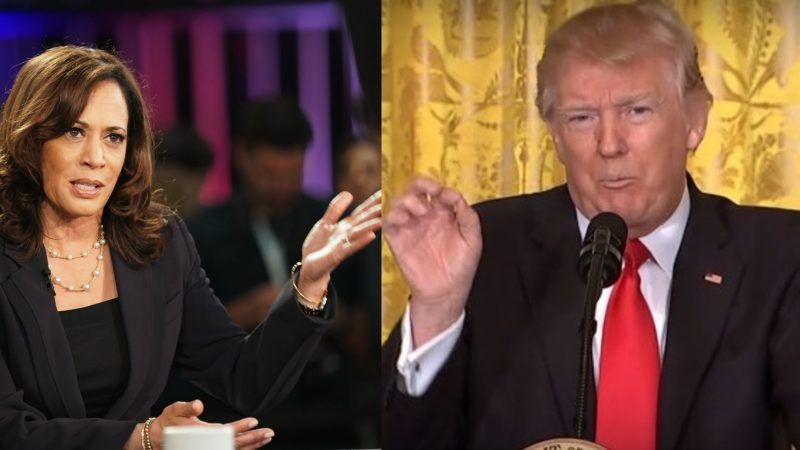Kamala Harris and Donald Trump Unite to Defend the Imperial Presidency
The senator and the president she wants to unseat are determined to have their way, regardless of what the law says.

When Congress declined to allocate the money he wanted for a wall along the southern border, Donald Trump refused to take no for an answer. Kamala Harris, one of the Democrats vying to oppose Trump in next year's presidential election, likewise vows that if Congress does not change federal gun laws, she will do it by "executive action."
The president and the California senator are both unwilling to let a recalcitrant legislature stop them from keeping their campaign promises, and supporters who share their goals may be inclined to cheer them on, even while faulting the other side for disregarding the rule of law and the constitutional separation of powers. That double standard is useful in the short run but disastrous in the long run, enhancing the imperial presidency in ways that members of both major parties will come to regret.
Last Friday, Haywood Gilliam, a federal judge in California, issued two permanent injunctions against Trump's attempt to fund his "great, great wall" with money that Congress never approved for that purpose. As Gilliam explained in a preliminary ruling last May, "Congress's 'absolute' control over federal expenditures—even when that control may frustrate the desires of the Executive Branch regarding initiatives it views as important—is not a bug in our constitutional system. It is a feature of that system, and an essential one."
Trump tried to get around that constraint by invoking 10 USC 2808, which allows the secretary of defense to "undertake military construction projects…not otherwise authorized by law" when the president declares a national emergency "that requires use of the armed forces." But as Gilliam pointed out, the law's definition of "military construction"—which involves a "military installation" such as "a base, camp, post, station, yard, [or] center," cannot reasonably be read to encompass Trump's wall.
Trump is also relying on Section 8005 of the most recent Defense Department appropriations act, which allows the department to use "working capital funds" for "higher priority items" that serve "unforeseen military requirements," provided the project is not one for which funding "has been denied by the Congress." Yet it was legislators' refusal to approve the funding Trump wanted for his wall that prompted this end run, and a project he has been touting since before he was elected and for which he has sought financing since February 2018 can hardly be described as an "unforeseen military requirement."
Harris shows a similar disregard for the law. "The problem," she explained during last Thursday's Democratic presidential debate, "is Congress has not had the courage to act." If she is elected and Congress declines to approve "universal background checks" for gun buyers, Harris said, she will unilaterally impose "the most comprehensive background check policy we've had."
Harris' plan involves redefining anyone who sells more than four guns in a single year as a federally licensed dealer, meaning he would have to conduct background checks. That plan is clearly at odds with the statutory definition of "dealer," which excludes "a person who makes occasional sales, exchanges, or purchases of firearms for the enhancement of a personal collection or for a hobby, or who sells all or part of his personal collection of firearms."
Harris also claims she can eliminate the so-called boyfriend loophole by presidential fiat. Under current law, people convicted of misdemeanors involving "domestic violence" are barred from possessing firearms, but crimes against dating partners count as "domestic violence" only if the perpetrator has lived with the victim or produced a child with him or her. Whether or not that makes sense, Congress has defined "misdemeanor crime of domestic violence," and only Congress can change the definition.
Regardless of how you feel about Trump's border wall or Harris' gun control agenda, the way they achieve their goals matters. Before Americans assent to the use of extraconstitutional presidential powers by politicians they like, they should imagine how those powers might be used by politicians they despise.
© Copyright 2019 by Creators Syndicate Inc.


Show Comments (36)